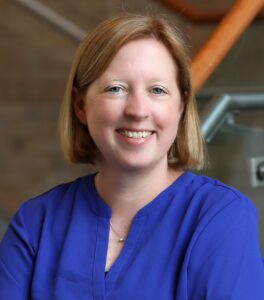Dr. Megan Cooper Appointed Director of Pediatric Rheumatology & Immunology Division at WashU
 Megan A. Cooper, MD, PhD, a physician-scientist recognized internationally for her work in pediatric immunodeficiencies and immune dysregulation, took the reins of the Division of Pediatric Rheumatology and Immunology at Washington University School of Medicine, St. Louis, as director this past fall. Her first mission as director was “to continue the robust division that we had,” she says. There are nine faculty members in that division, “so I was in a very lucky position,” she notes.
Megan A. Cooper, MD, PhD, a physician-scientist recognized internationally for her work in pediatric immunodeficiencies and immune dysregulation, took the reins of the Division of Pediatric Rheumatology and Immunology at Washington University School of Medicine, St. Louis, as director this past fall. Her first mission as director was “to continue the robust division that we had,” she says. There are nine faculty members in that division, “so I was in a very lucky position,” she notes.
Dr. Cooper has been a faculty member in the School of Medicine since 2010, and previously directed the Clinical Immunology Program, a collaboration among multiple specialties, including rheumatology and immunology, allergy and pulmonary medicine, hematology and oncology, as well as infectious disease. This month, she’ll step down from her post as associate director of the Medical Scientist Training Program to concentrate on her top priorities for the division.
“Here at Washington University, we have a long history, especially in pediatrics, of being highly supportive of physician-scientists, so I would like to grow that in our division,” Dr. Cooper says.
She also sees opportunities to enhance training in some of the newer initiatives in the pediatric rheumatology space, such as using ultrasound in more clinics, and adding clinics that specialize in specific diseases.
Dr. Cooper found herself drawn to pediatric rheumatology for two reasons. First, early in her medical education, Dr. Cooper realized she was attracted to the quality of resilience in children—“they just want to get better so they can go out and play!”
Then, during her doctoral studies as part of the MD/PhD program at Ohio State University, Columbus, she was mentored by oncologist Michael A. Caligiuri, MD, currently president of the City of Hope National Medical Center and a professor in the Division of Leukemia, Department of Hematology and Hematopoietic Cell Transplantation, studying the immune response of natural killer cells. During that time, she heard a presentation about a new gene therapy to cure severe combined immune deficiency. This line of investigation, she notes, “really sparked my interest in pediatric immunology.”
She completed her residency and then a fellowship in pediatric rheumatology at the Washington University School of Medicine, and was subsequently hired as a faculty member.
In her own laboratory, she and her team have—among other discoveries—identified and characterized new genetic defects of the immune system that lead to autoimmunity and immune dysregulation in children.



